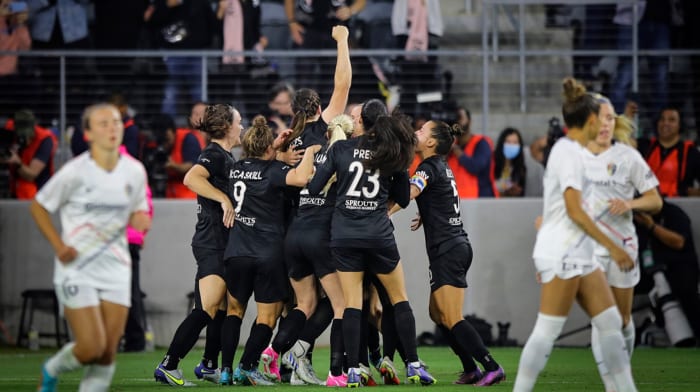Angel City FC Cofounder Launches Monarch Collective, a New Way to Invest in Women’s Sports

Angel City FC celebrates scoring a goal.
Meg Oliphant/Getty Images
NWSL’s Angel City Football Club cofounder Kara Nortman is on to her next big thing: the Monarch Collective. The venture capitalist launched the investment fund, which is exclusively focused on investing in women’s sports, on Monday in partnership with fellow venture capitalist Jasmine Robinson. The goal is to drive money into women’s sports teams, leagues, media, products, games and other related revenue streams.
They have already raised $100 million for their debut fund, and tennis legend Billie Jean King is an initial investor.
The private equity firm was founded “through a shared conviction that sports can change hearts, minds and culture,” per an essay written by Nortman. “In order to do it, we believe that equity in investment and representation is critical for success.”
Nortman and Robinson were able to identify a huge untapped market in investing in women’s sports. The WNBA raised $75 million in a first-ever funding round last year, increasing the league’s value to $1 billion.
I just published INTRODUCING MONARCH COLLECTIVE: GOING ALL-IN ON WOMEN’S SPORTS https://t.co/qQnicoNbpV
— Kara Nortman (@karanortman) March 27, 2023
“I’ve spent a lot of time thinking about where is the right place to put capital now in this ecosystem,” Robinson explained to the Los Angeles Times. “Over the past couple of years, I just kept coming back to women’s sports.”
Nortman noted that the Monarch Collective is interested in using sports teams and ownership to foster communities and future changemakers, in addition to funding sports such as soccer, basketball, golf, tennis and potentially even cricket, which have a large global or domestic audience.
“If you go back in time on the men’s side, how would you grow ownership groups in these markets so you can have different types of people as community leaders in their hometown?” Nortman said in response to how she’s tackling each arising question.
With the success of Angel City FC and growing viewership numbers in alignment with increased broadcasting of women’s sports, Nortman and Robinson have faith that the Monarch Collective will be successful. They hope to gradually reverse the trend of female athletes being “underserved and, at times, even ignored by too many hundred-year-old sports communities.”
